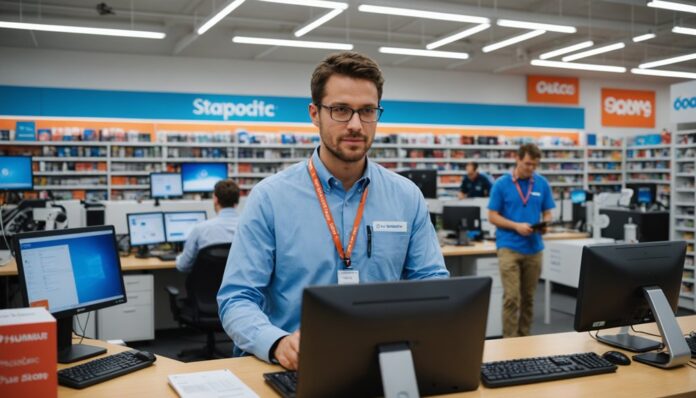Major retailers offer a range of tech support services to cater to diverse customer needs. In-store assistance, online troubleshooting via email, chat, and phone, and dedicated tech support websites are among the options available. Many retailers also provide premium services, such as in-home setup and repair, for an additional fee. The specifics of these services, including their benefits and limitations, vary by retailer, raising questions about their effectiveness and worth.
Highlights
- Major retailers offer various tech support services, including in-store assistance, online troubleshooting, and dedicated support websites.
- Retailers like Best Buy and Walmart provide tiered support options, including premium services like in-home setup and repair.
- Some retailers offer complimentary tech support with product purchases, while others charge a fee starting at around $10 per month.
- Retailer-provided tech support services often rely on general knowledge and scripted protocols, which may not match specialized tech support services.
- Pricing models vary among retailers, allowing consumers to select support levels that fit their needs and budget, starting at around $20 per session.
Types of Tech Support Services Offered by Retailers
A multitude of tech support services are offered by retailers to cater to the diverse needs of their customers.
In-store assistance is a common type of support provided, where customers can visit a physical store and receive help from a technician or a knowledgeable sales representative.
Many retailers also offer online troubleshooting, which allows customers to receive support remotely through email, chat, or phone.
Some retailers provide dedicated tech support websites with extensive resources, including FAQs, tutorials, and repair guides.
Additionally, a few retailers offer premium support services, such as in-home setup and repair, for an additional fee.
These services aim to provide customers with flexible and convenient options for resolving their technical issues.
Retailers may also partner with manufacturers to offer specialized support for specific products.
Benefits of Using Retailer-Provided Tech Support
Retailer-provided tech support offers numerous benefits to customers seeking assistance with their technical issues. One of the primary advantages is increased customer satisfaction. Retailers are invested in ensuring that their customers are happy with their purchases, and providing reliable tech support is a key aspect of this.
In addition, retailer-provided tech support enhances service accessibility. Customers can easily reach out to the retailer’s support team through various channels, such as phone, email, or in-person visits. This convenience nurtures a sense of belonging and trust between the customer and the retailer.
Moreover, retailers often have extensive knowledge of the products they sell, allowing them to provide specialized support and resolve issues efficiently. This proficiency contributes to a positive overall customer experience.
Limitations of Retailer-Provided Tech Support Services
While retailer-provided tech support services offer numerous benefits, there are several limitations that can impact their effectiveness.
One major limitation is service availability. Retailer-provided tech support services may not be available 24/7, and customers may have to wait in line or schedule an appointment to receive assistance.
Additionally, the level of proficiency offered by retail staff may not be on par with specialized tech support services. Proficiency limitations can lead to frustration and unresolved issues, particularly for customers with complex technical problems.
Moreover, retailer-provided tech support services may not cover all types of devices or software, which can limit their usefulness for customers with diverse technological needs.
These limitations can negatively impact the overall customer experience.
Comparison With Traditional Tech Support Options
The limitations of retailer-provided tech support services highlight the importance of considering alternative options.
Traditional tech support options, such as manufacturer support and third-party services, offer distinct advantages over retailer-provided services. Manufacturer support often provides thorough knowledge of specific products, while third-party services may offer more extensive and specialized proficiency.
In contrast, retailer-provided services may rely on general knowledge and scripted troubleshooting protocols. Customer experiences can vary greatly between these options, with some preferring the personalized approach of traditional tech support and others appreciating the convenience and accessibility of retailer-provided services.
Ultimately, assessing retailer advantages against the benefits of traditional tech support options allows individuals to make informed decisions about their technical support needs.
Retailer-Specific Tech Support Services and Pricing
Although some retailers offer complimentary tech support with product purchases, many others charge for their services or offer tiered support options with varying price points.
Retailer-specific tech support services and pricing models vary widely, reflecting the diverse range of retailer partnerships and target markets. Some retailers, like Best Buy, offer a range of support options, including in-store consultations, online chat support, and in-home technical assistance, with prices starting at around $20 per session.
Others, like Walmart, partner with third-party providers to offer affordable support options, with prices starting at around $10 per month.
These pricing models allow consumers to select the level of support that best fits their needs and budget, while also providing retailers with opportunities to generate revenue and build customer loyalty.
The Future of Retailer-Provided Tech Support Services
Advances in technology and shifting consumer expectations are ready to greatly impact the delivery of retailer-provided tech support services.
The future of tech support will be shaped by emerging technologies such as artificial intelligence, augmented reality, and the Internet of Things. These technologies will enable retailers to provide more personalized and proactive support, anticipating and resolving issues before they arise.
Customer expectations are also driving the demand for omnichannel support, where seamless interactions occur across online, in-store, and mobile platforms. Retailers must adapt to these changes by investing in advanced tools and training their staff to meet the changing needs of their customers.
Conclusion
Major retailers have successfully integrated tech support services into their customer provisions, providing diverse options that cater to various needs. While these services have limitations, they offer numerous benefits, including accessible and knowledgeable assistance. As technology continues to evolve, retailer-provided tech support services are likely to expand, incorporating emerging trends and innovations to enhance customer satisfaction and loyalty. Retailers must continue to adapt and improve their tech support services to remain competitive.


